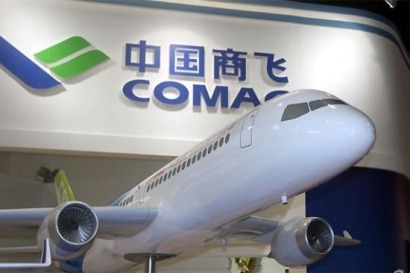
The research facility is called the Boeing-COMAC Aviation Energy Conservation and Emissions Reductions Technology Center.
"Energy conservation emission reduction has currently become the hotspot and focus of the global aviation sector, and our collaboration with Boeing in this regard will have profound impacts in China as well as the world," said Shi Jianzhong, vice president of COMAC.
"Meanwhile, we wish to construct the new center as a demonstrative advanced technology center and to make contributions to the development of the aviation industry in China and world with the concerted efforts of both sides," Jianzhong said.
Funded by both companies, the Boeing-COMAC Technology Center is working with China-based universities and research institutions to expand knowledge in areas such as sustainable aviation biofuels and air traffic management that improve commercial aviation's efficiency and reduce carbon emissions. It is located in COMAC's new Beijing Aeronautical Science and Technology Research Institute (BASTRI).
"The new Boeing-COMAC Technology Center reflects our companies' mutual commitment to make progress on industry challenges, such as the need to reduce carbon emissions. These industry issues cannot be solved by one company alone. What better way to address them than in partnership," said Marc Allen, president of Boeing China. "Our work with COMAC continues what is now four decades of Boeing partnership with airlines, government agencies, suppliers and research institutions to support the development of China's aviation industry."
The first research project aims to identify contaminants in "gutter oil" and processes that may treat and clean it for use as jet fuel.
Waste cooking oil shows potential for sustainable aviation biofuel production and an alternative to petroleum-based fuel because China annually consumes approximately 29 million tons of cooking oil, while its aviation system uses 20 million tons of jet fuel. Finding ways to convert discarded "gutter oil" into jet fuel could enhance regional biofuel supplies and improve biofuel's affordability.
"We are excited about opportunities to partner with world-class research capabilities in China in ways that will accelerate the global push for renewable jet fuels and support commercial aviation's growth while reducing its environmental footprint," said Dong Yang Wu, vice president of Boeing Research & Technology - China.
"With the joint efforts of COMAC and Boeing, Boeing-COMAC Technology Center will make continuous progress and breakthroughs not only in the area of aviation biofuel development, but also other technologies of carbon emission reduction," said Qin Fuguang, President of BASTRI.
For additional information:

